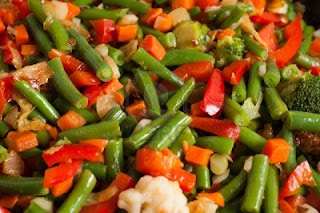There are many ways, and myths, to storing fruits and vegetables correctly to ensure longer freshness. After trial and error, and lots of research, I have found these ideas to be the best ways to store food to make it last as long as possible. I don't like grocery shopping anyway, so the less I have to go, the better.
Cilantro:
I love cilantro, but even though it is really cheap, it doesn't stay fresh long...at all.
Solution: Fill a glass jar half way with water, place the cilantro stalk inside, wrap/top with a plastic bag, and place it in the refrigerator.
Guacamole:
There are several ways to keeping guacamole lasting longer without turning brown quickly (as well as many myths), but I have found this to be the best solution:
One of the best ways that I have used is spraying the top of the guacamole with cooking spray (preferably olive oil spray), then tightly wrapping the bowl with plastic wrap (use a glass bowl so plastic will stick). Then I put it in the fridge.
Potatoes And Onions:
Don't store them together! They may taste good together after cooking, but they will spoil quickly if you put onions and potatoes together.
Store onions in a cool, dry place with good air circulation. This will make them last 2-3 months.
Store potatoes with apples to keep them from sprouting.
Immediately Remove Spoiled Fruit & Veggies:
One rotten apple can spoil the whole bunch. The same goes for many other fruits and vegetables.
If you notice a fruit or vegetable starting to get moldy, spoil, wrinkly, or the texture isn't right, immediately remove it from the bunch.
Bananas:
Wrap the top stem of the banana bunch with plastic wrap, then wrap it with a little bit of foil, to ensure your bananas stay fresh longer for at least 3-5 days.
If your bananas start to go bad, don't throw them away! Put in your freezer to save for a time to make banana bread or frozen smoothies.
Tomatoes:
Never store tomatoes in plastic bags. I know you've done it...we all have. But the ethylene in the plastic bags will make the tomato ripen faster.
If you want them to ripen faster, store with fruit.
Ripe tomatoes should be kept at room temperature, on the counter and away from the sunlight.
Over-ripe tomatoes should be kept in the fridge until ready to eat.
Mushrooms:
Store mushrooms in a paper bag, not plastic. The plastic will cause them to mildew.
If you buy mushrooms that come in a styrofoam container, the mushrooms will be okay for a couple days in the container. But if you don't use up the mushrooms soon, they will also start to mildew.
Do not wash mushrooms until you are about to cook / eat them. They need to be as dry as possible to prevent mildew.
Mason Jars - Great For Storage:
Mason jars are better than plastic containers when it comes to keeping food fresh longer in the fridge. It is also a healthier alternative than plastic, which can deteriorate and stain easily.
Fresher, Crisper Lettuce:
Don't wash salad mix or lettuce until ready for eating / cooking. You want lettuce to stay as dry as possible (without moisture) or it will wilt the lettuce and lose it's crispness. It will also start to brown quickly with moisture.
Use a salad spinner or place a paper towel in the bowl / bag before putting in the fridge to soak up as much moisture as possible.
Coffee:
If you don't use up coffee often, or bought a few bags during a "Buy One Get One Free" sale, the best way to keep coffee grinds or beans fresh and lasting longer is to put them in the freezer.
Coffee grinds will not freeze like food does. The texture stays the same, so as soon as you take it out of the freezer, you can instantly pour the grinds into the pot to brew. Coffee beans are the same way. They may be a little harder than they were before you put them in the freezer, but they will work perfectly great when grinding for a fresh and bold brew.
Loaf of Bread:
If you have difficulty using up bread before it dries out or gets moldy, the best option is to keep it in the fridge. It will last twice as long.
Keep bread out of damp, enclosed areas. This will cause the bread to mold quickly.
Fruits:
You can always freeze fruit if you bought more than you need, or if you aren't using it up quick enough.
The texture may not be the same after you freeze fruits, but they are great for making smoothies, sangria, or other recipes.
Vegetables:
You can also freeze most vegetables. Doing this is great for cooking, stir fry, and baking.
Again, the texture may not be the same after freezing some vegetables, but if you will be using it to cook with (instead of eating raw), then this is a great way to keep un-used vegetables lasting long.
























0 nhận xét:
Đăng nhận xét